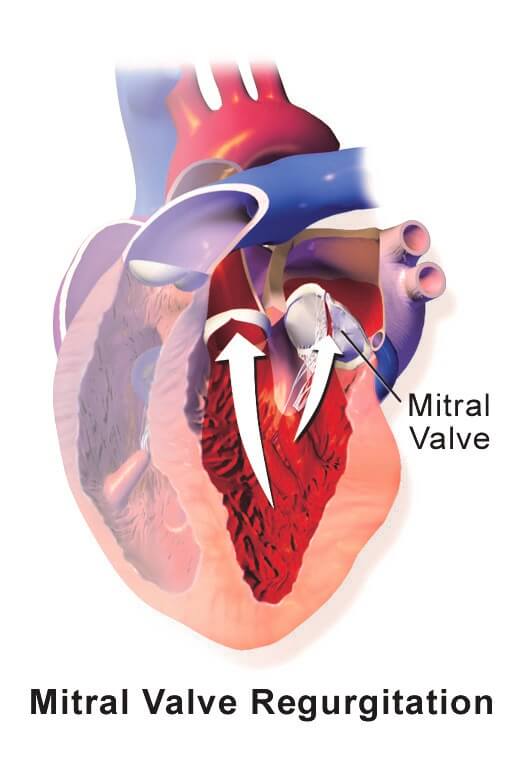About Mitral Valve Regurgitation
Mitral valve regurgitation is a condition where one of the heart’s valves, called the mitral valve, does not close properly. Normally, heart valves open and close with each heartbeat to make sure that blood flows in only one direction. In mitral valve regurgitation, when the valve does not close fully, it causes blood to flow or “leak” backward into the heart’s upper chamber. This makes the heart work harder to push blood out to the rest of the body. This condition is also known as mitral valve insufficiency or mitral valve incompetence.
Types of Mitral Valve Regurgitation
Mitral valve regurgitation can happen suddenly (acute), or gradually over time (chronic). There are two types:
- Primary mitral valve regurgitation: Happens when there is damage (from infection) or a problem to the valve itself, preventing it from closing properly.
- Secondary mitral valve regurgitation: Occurs when another heart condition or disease affects the mitral valve, preventing it from working properly. It is sometimes called functional mitral valve regurgitation.
Symptoms of Mitral Valve Regurgitation
Like other heart valve diseases, mitral valve regurgitation may not cause symptoms at first. As the condition becomes more severe, it will start to affect the heart’s function and symptoms may appear. The first symptom is often shortness of breath (feeling like you cannot get enough air into your lungs). Other symptoms include:
- Shortness of breath and rapid breathing
- Shortness of breath that occurs when lying down
- Being awoke from sleep with shortness of breath
- Fatigue or exhaustion
- Coughing
- Lightheadedness
- Swollen feet or ankles
- Excessive urination
- Heart palpitations or rapid heartbeat, including atrial fibrillation

Causes and Risk Factors
The causes of mitral valve regurgitation vary based on type:
- Primary mitral valve regurgitation can be caused by damage or problems with the valve or its parts, or by normal aging, where the valve stretches or wears out over time. This is also called degenerative mitral valve regurgitation. A common cause is mitral valve prolapse when the valve apparatus is structurally larger than normal.
- Secondary mitral valve regurgitation can be caused by other conditions like coronary artery disease (CAD), congenital heart disease, mitral valve stenosis, pulmonary hypertension (high blood pressure in the lungs), rheumatic heart disease, connective tissue disease, endocarditis, atrial fibrillation, or dilated, ischemic or hypertrophic obstructive cardiomyopathy.
You are also at higher risk if you have had chest radiation, a common treatment for different cancers.
-
Physical Exam
-
Chest X-Ray
-
Electrocardiogram
-
Transesophageal Echocardiogram
-
Diagnostic Cardiac Catheterization
-
Cardiac CT Scan
-
Cardiac MRI
Your cardiologist will listen to your heart and lungs with a stethoscope, looking for a “clicking” sound made by the valve leaflets. They may also hear a murmur from the blood leaking backward. These sounds are often the first signs of mitral valve regurgitation.
Also known as an ECG or EKG, this test records the electrical signals in the heart to check its rhythm. Valve problems make the heart work harder and can cause heart rhythm issues. This test is often performed in your cardiologist’s office.
A transesophageal echocardiogram (TEE) is a type of echocardiogram that uses a thin tube placed down your throat into the esophagus to take detailed video of your heart function, especially the mitral valve from inside your body. It is one of the best ways to confirm mitral valve regurgitation, diagnose its severity and identify the cause of mitral regurgitation. TEEs are performed at the following BayCare locations:
This procedure shows how the mitral valve opens and closes, measuring blood flow and pressure on both sides of the mitral valve. Your cardiologist may also check for coronary artery disease using coronary angiography. This is an imaging process that evaluates the heart’s blood vessels. The following BayCare hospitals perform diagnostic cardiac catheterizations:
This test takes 3D X-ray images to measure the mitral valve’s structure. These measurements can help your cardiologist understand if your mitral valve has stretched, thickened, or calcified. This test can be scheduled at a BayCare Imaging Center.
Treatment Options
Treatment for mitral regurgitation depends on several factors including suddenness of symptoms, severity, and your overall health. Mild or moderate cases may only need treatment if the condition worsens or is causing symptoms. Your cardiologist may watch your condition and order testing over time. When it becomes severe, common treatments include:
-
Lifestyle Adjustments
-
Medications
-
Open-heart Surgery
-
Transcatheter Mitral Valve Repair
-
Transcatheter Mitral Valve Replacement
Your cardiologist may recommend some lifestyle adjustments to improve symptoms including:
- Eating a heart-healthy diet that is low in salt (sodium) and saturated and trans fats
- Maintaining a healthy weight
- Getting enough sleep
- Stopping or limiting your alcohol and caffeine intake
- Avoiding smoking, tobacco, or nicotine products and illegal drugs
- Discuss all exercise regimens with your doctor before you start
Medications can reduce symptoms but cannot correct the underlying structural problem with the mitral valve. Common medications your cardiologist may prescribe include:
- Angiotensin-converting enzyme (ACE) inhibitors: These medications help lower blood pressure and reduce the heart’s workload, which could lessen symptoms of regurgitation.
- Blood thinners: Also called anticoagulants, these medications prevent blood clots, especially if your valve disease is causing heart rhythm problems like atrial fibrillation.
- Beta-blockers: Medications that help reduce the workload of the heart when the pump function is not working as well
- Diuretics: Also called “water pills,” these help your body remove excess fluid and reduce the strain on your heart.
- Heart rhythm medications: These helps control the speed (rate) at which your heart pumps and help it stay in a normal rhythm.
This traditional “open chest” surgery is used to repair or replace the mitral valve. The chest is opened at the breastbone, and a heart-lung machine is used to take over the work of the heart and lungs during surgery. If the valve is replaced, a cardiovascular or cardiothoracic surgeon may use mechanical (metal)or bioprosthetic valve. BayCare has three award-winning open-heart surgery programs at these hospitals:
Transcatheter Mitral Valve Repair (TMVr) is a minimally invasive option for people who cannot have open-heart surgery. Unlike traditional surgery, TMVr does not require opening the chest or temporarily stopping the heart. During TMVr, a catheter is inserted through a vein in the leg and is used to implant a clip on the mitral valve. This clip helps the valve leaflets come together and improve their ability to open and close. This procedure is sometimes referred to as transcatheter edge-edge repair (TEER). TMVr is available at these BayCare Hospitals:
Transcatheter Mitral Valve Replacement (TMVR) is another minimally invasive procedure. A special catheter is inserted through a blood vessel and is used to place a new mechanical or bioprosthetic valve inside the existing mitral valve. It does not require opening the chest or a heart-lung machine. TMVR is performed at the following BayCare Hospitals:
Living with Mitral Valve Regurgitation
People with mitral valve regurgitation can live a full life if the condition is effectively managed. Since it is a progressive condition, most people will eventually need treatment. After treatment, your cardiologist or surgeon may prescribe cardiac rehab to help your heart recover. Here are some tips for living with mitral valve regurgitation:
- See your cardiologist regularly to monitor your condition and share any new or worsening symptoms.
- Watching your weight, as extra weight may indicate fluid retention and condition progression.
- Be active with recommended or supervised exercise.
- Track your blood pressure often, especially if you have high blood pressure.
- Be mindful of infection risks, especially if you have had a valve replacement. Even minor cuts, dental work, or other procedures could lead to infection. Talk to your cardiologist before you have any dental work or scheduled procedures.
Additional Resources

Mitral Valve Regurgitation
Dr. Joshua Rovin discusses causes, symptoms and diagnosis of mitral valve regurgitation as well as the preventative measures at treatment options available.

